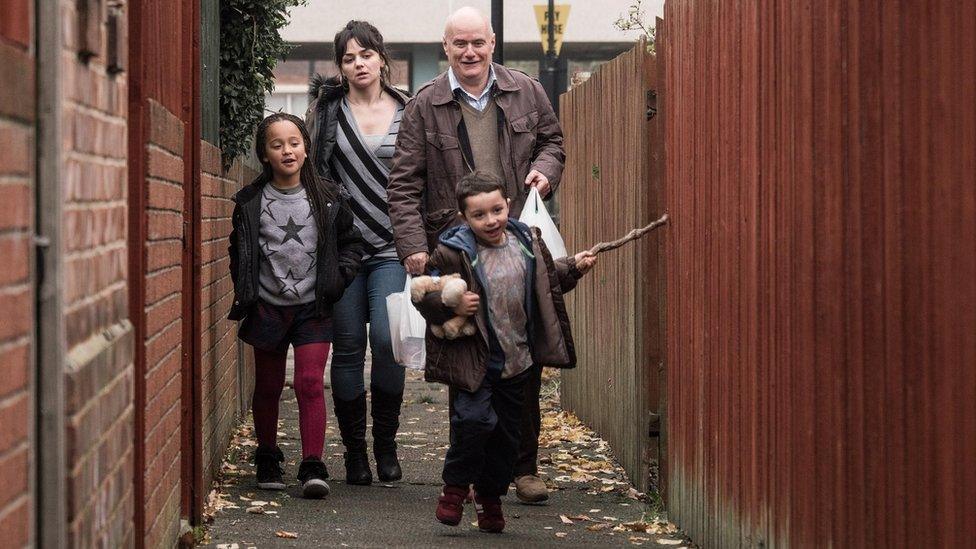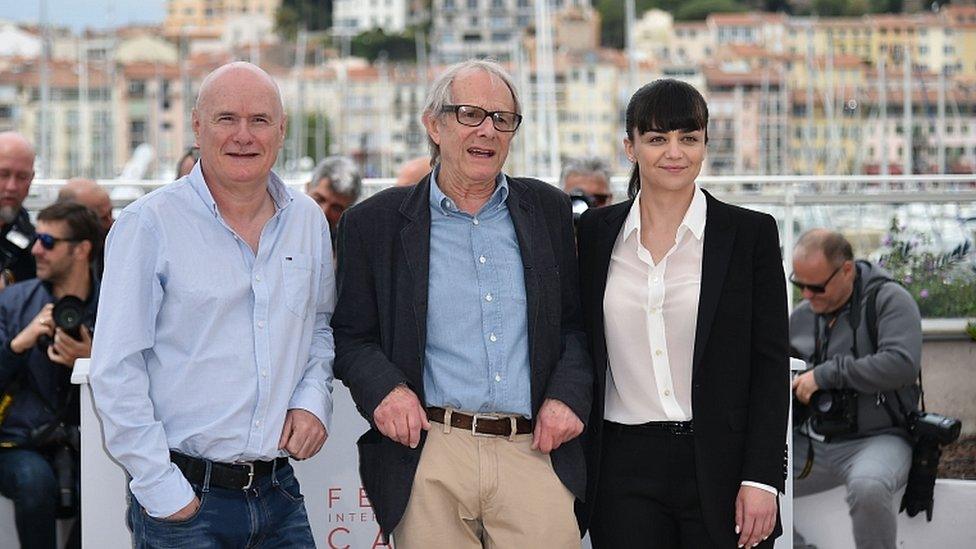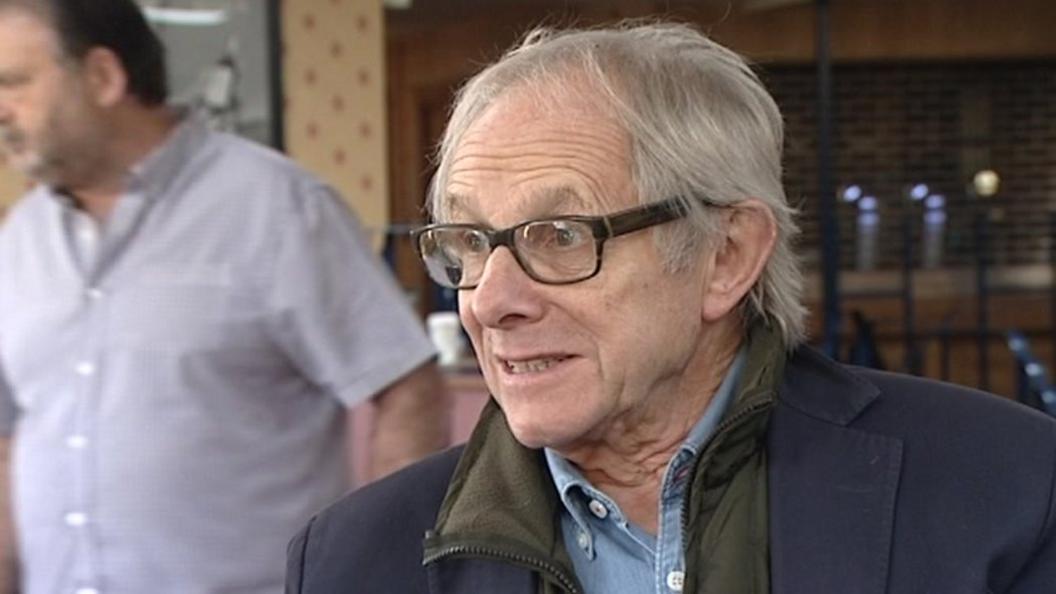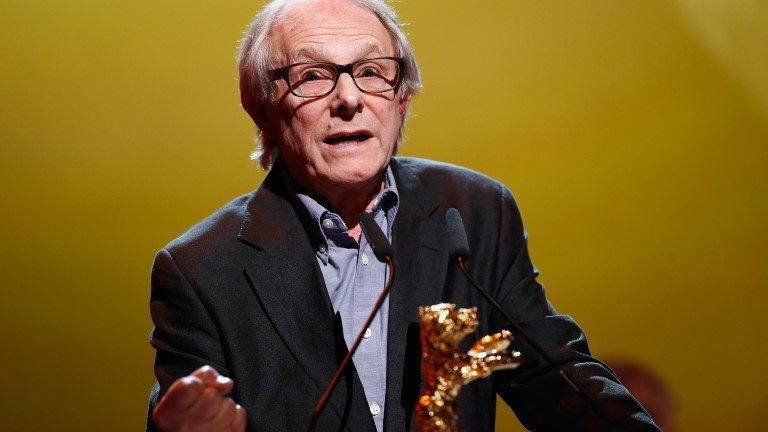Ken Loach takes on welfare system in I, Daniel Blake
- Published

I, Daniel Blake stars Dave Johns and Hayley Squires
Two years ago he suggested he would be retiring from film-making, but instead 79-year-old director Ken Loach has won the coveted Palme D'Or award for the second time at the Cannes Film Festival.
The winning film, I Daniel Blake, marks the 13th time that Loach, the director of more than 50 movies, has competed at the event. It's also exactly 10 years since he won the same prize for his 2006 Irish drama The Wind That Shakes The Barley, starring Cillian Murphy.
Loach uses I, Daniel Blake to expose the welfare system in the UK, and says he wants the film "to break audience's hearts, but also to make them angry".
Daniel Blake, played by stand-up comedian Dave Johns, is an older man living in Newcastle who, because of a heart attack, can no longer do his job.
However, a mobility test by the Department of Work and Pensions declares him fit for work and while he waits for his appeal, Daniel Blake can only claim Jobseekers Allowance.
His inability to take any work offered means his money is stopped, and he begins to go hungry.
Loach, a social campaigner for most of his career, believes the current criteria for claiming benefits in the UK is "a Kafka-esque, Catch 22 situation designed to frustrate and humiliate the claimant to such an extent that they drop out of the system and stop pursuing their right to ask for support if necessary".
"The state's attitude is not an accident," he claims.
"The poverty, the indignity, the humiliation people go through is consciously done.
'Human consequences'
"The state is knowingly inefficient or cruel, knowing that people will be driven to frustration, despair, hunger and possible suicide.
"Claimants are portrayed as 'scroungers' in the media but research has found that less than 1% of claims for benefits are fraudulent.
"That's certainly less than the figures for tax evasion, for example.
"But there's an attitude that suggests that if you're poor, it's your fault. If you are out of a job, it's your fault. It's done to get the numbers down and the most vulnerable in our society are suffering as a result."

Loach says he wanted to "explore the human consequences of welfare policy"
Half a century ago, Ken Loach wrote the screenplay for the BBC play Cathy Come Home, which examined homelessness in Britain in 1966, and the director says his latest film "is a snapshot of how life can be lived in Britain in 2016".
"We wanted to explore the human consequences of welfare policy in terms of relationships, and who people become through these policies."
Loach and his long-time collaborator, writer Paul Laverty, spent several months visiting British cities such as Stoke, Newcastle, Liverpool and Glasgow, meeting people seeking work, or on low-paid or zero-hour contracts.
"We started in my home town of Nuneaton and met a young lad there who was sleeping on a mattress in a charity home.
"He was doing the odd bit of work on zero-hour contracts, he'd given up on benefits - he said it was too humiliating.
"He hadn't worked for a couple of weeks, and the week before he hadn't eaten for four days.
"I opened his fridge and there was nothing in it - nothing at all. And this was one of the first people we encountered."
'Desperate poverty'
Loach and Laverty say they also based a pivotal scene in the film, where a mother arrives at a food bank having not eaten for days, on a real anecdote from one of the centres they visited in Glasgow.
"Food banks have been praised by the state without any sense of shame at all and yet it's appalling in 2016 that people are having to make the choice between food and heating, which is common.
"After the war in 1945, we were desperately poor in Britain, but there is no way people would have been starving, their communities wouldn't have let them.

The director and the film's stars were in Cannes for its launch
"That we now have this situation is testament to the policy of individualism that successive governments have pursued.
"It's shocking that we are apparently such a wealthy nation with such grotesque wealth at the top and such desperate poverty and fear at the very bottom."
The film has won widespread acclaim from critics, with Variety magazine calling it "one of Loach's finest films, a drama of tender devastation, a work of scalding and moving relevance".
But despite its concentration on the UK welfare system, Loach, who will be 80 next month, insists that the movie also applies to an international audience.
"There is a conscious cruelty in the way we organise our lives now which means the most vulnerable people in society, such as the disabled, are caught in this unfair situation.
"They are often unable to live with dignity, and instead suffer pain and deep despair.
"It's deeply shocking that this is happening at the heart of our world."
I, Daniel Blake will be released in the UK later this year
- Published16 May 2016

- Published14 April 2016

- Published17 November 2015

- Published14 February 2014
